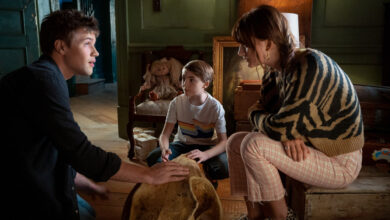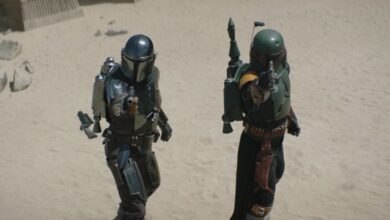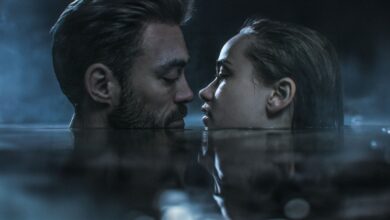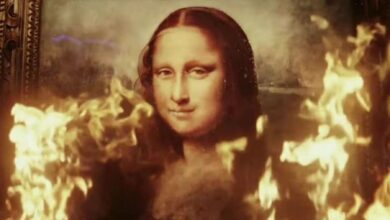Beau Is Afraid Ending Explained: Who is Beau’s Mysterious Father? What is Beau Afraid Of?
The long-awaited Beau Is Afraid finally made its debut in cinemas, the third feature film behind the camera for Ari Aster and starring an always-intense Joaquin Phoenix. A highly anticipated film because it not only deviates from the pure horror that had distinguished the director’s two previous films (Hereditary, Midsommar) but above all because it presents itself to its target audience as a real cinematic odyssey into the mind of the protagonist of the lasting nearly three hours. A project, therefore, which could only generate feverish anticipation and a great deal of curiosity. We’ve already seen Ari Aster’s unclassifiable psychodrama and talked about it with vivacity and perplexity in our review, and we want to unravel the skein of the film’s hyper-stratification of meaning with Phoenix with our explanation of Beau Is Afraid ending. with the awareness that our analysis will only be a small piece in an ocean of interpretations that will come to the surface in the coming weeks, months, or even years.
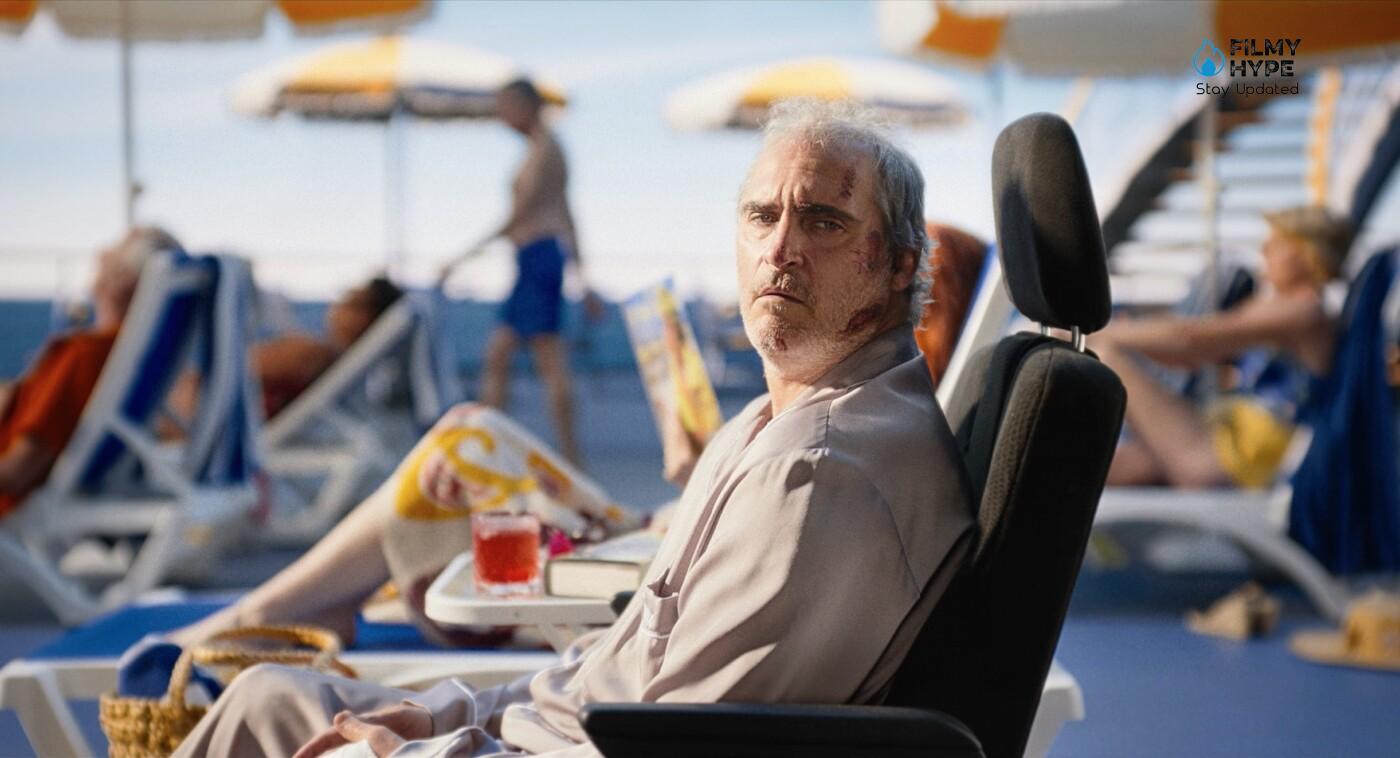
Beau Is Afraid: Summary Recap
Beau (Joaquin Phoenix) is a fifty-year-old loner who lives in a dilapidated apartment building in one of the city’s weirdest and most dangerous neighborhoods. He is constantly followed by a psychiatrist (Stephen McKinley Henderson) who prescribes new drugs to reduce Beau’s anxieties and paranoid fears. The protagonist seems to have a contradictory relationship with her mother, a famous successful woman in the pharmaceutical industry named Mona (Patti LuPone): she is too tied to her son who visits her on her birthday. A ritual that suffocates our Beau, a victim of events, year after year. Leaving for the journey to his mother’s house, Beau experiences a particular situation that will upset his plans, leading to a near-death experience.
While being looked after by a family who decides to take care of him, Beau receives an unexpected phone call: his mother died suddenly. Now ours must necessarily undertake a journey home and make peace with the parent’s corpse. We have chosen to summarize only the beginning of the film, so as not to spoil the surprise of discovering the various situations that Beau is forced to face. Suffice it to say that as the journey continues, Beau’s experience (and consequently that of the viewer) will become increasingly smoky, liquid, and fluid, straddling imagination and reality, between mental perception and tangible matter.
Based on the 2011 short film of the same name, the plot of Beau Is Afraid revolves around a middle-aged man, Beau (Joaquin Phoenix), who on the anniversary of his father’s disappearance has to go home to his mother. A rather simple, ordinary task that will have happened to each of us, especially those who are off-site or have lived for a very long time in a different place than their parents. Beau just has to wake up to be able to arrive at the airport at least two hours early, take the suitcase and the ticket, close the house, and go; indeed, a very simple operation Not for Beau. From the first moments, Ari Aster makes it clear to us that Beau is a person who doesn’t even know what the word simplicity is and, surely, he is a person with many unsolved problems that he tries to solve with therapy. Not surprisingly, the film opens with a session between Beau and his psychiatrist. Beau is insecure, paranoid, anxious, and so scared of life that he constantly feels inadequate.
He almost seems to live in another world, a child in the body of a big man, even making him a little creepy, almost wrong, in the gaze of the beholder. He makes him uncomfortable. But at the same time, as we get to know a little bit more about Beau, there is tenderness. Maybe compassion. Until Beau’s fears, his paranoia, begin to become ours. We cannot understand whether it works or not. You live in a terrible neighborhood inhabited by the worst scum possible and existing. He is in constant fear of being attacked and that the whole world is plotting against him. And what’s more, his relationship with his mother also seems particularly ambiguous. That classic love-hate of someone who has lived constantly under the shadow of a parent, shaped and confined in his expectations. On the one hand, Beau would just like to kill that kind of relationship, detach himself completely from his mother and take her autonomy; on the other hand, he knows he can’t do without it and the sense of guilt is and will always be too great to be able to give up the woman who, deep down he knows, ruined his life forever.
Beau Is Afraid Ending Explained: What is Beau Afraid Of?
For such a complex psychological drama with various levels of reading and interpretation, it is necessary to take a few steps back before arriving at the finale of Ari Aster’s third work and understand from which point of origin the extravagant and alienating adventure of our Beau starts. Wassermann. The character played by Phoenix is the son of a famous and wealthy businesswoman, Mona (Patti Lupone). He grows up without a father, who his mother says died during an orgasm when Beau was conceived, an inherited medical condition she claims was passed on to her son. As a teenager, on a cruise with his mother, Beau meets and falls in love with a girl named Elaine; there, the two kiss and promise to remain virgins until they meet again as adults. When I grow up.
His therapist (Stephen McKinley Henderson) prescribes him an experimental anxiety drug, to be taken categorically with water. Beau has to catch a flight to see his mother on the anniversary of his father’s death, but after a sleepless night he does not hear the alarm; after hasty packing, he discovers that her keys and his luggage have been stolen, and more; after a very short time he receives a strange and disturbing phone call from a UPS courier who announces that he has found his mother Mona killed by the sudden fall of a chandelier. It will be the beginning of a lysergic and absolutely unpredictable journey to the maternal home.
The Fine Line Between Reality and Imagination?
A journey that, as in the best narratological theories, involves encounters with other characters, clashes, and always different interpretations, but we’ll get to those shortly. After daring to escape from the apartment building into the seedy and dangerous neighborhood where he lives, Beau awakens semi-conscious after a car accident, to find that he has been rescued by the kind couple formed by Grace (Amy Ryan) and Roger (Nathan Lane). The two parents of the turbulent teenager Toni (Kylie Rogers) lost their son Nate as a soldier at the front in Caracas and after that tragic event, they decided to host Jeeves (Denis Menochet), an ex-soldier friend of Nate’s with a problematic and psychotic. Grace and Roger promise to take Beau to their mother’s funeral.
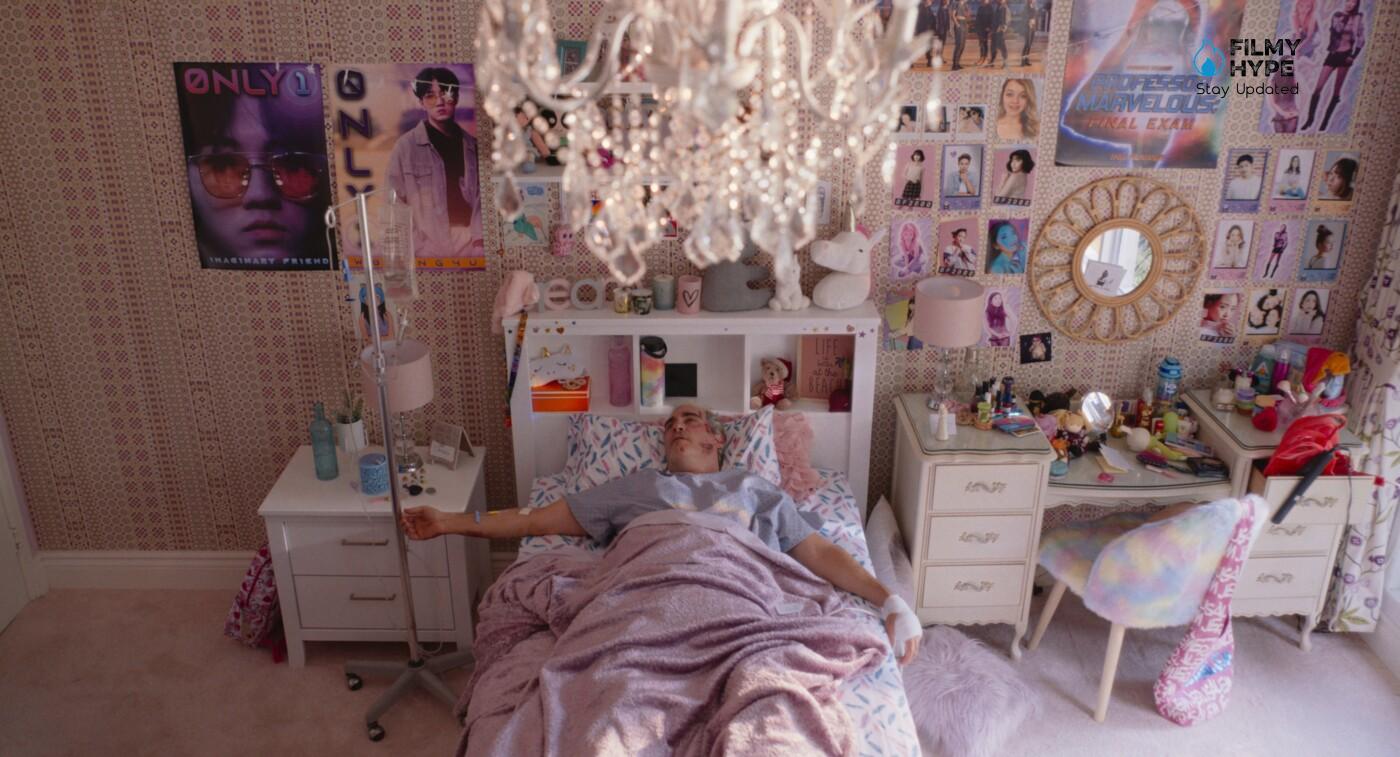
Beau manages to flee the couple’s home after their daughter Toni kills herself by swallowing an entire can of paint in Nate’s bedroom; Grace blames Beau and the latter, hunted by the mad Jeeves, escapes through the couple’s French windows and enters the woods. Here at night, he gets to know a community of actors called “The orphans of the forest”, where he attends a staging which, in some points, seems to remind him of parts of his own life, or at least of a future life that he ever made, complete with his wife and children. As if that show on stage represented for him the greatest unfulfilled desire of his life, but which he has never been able to fulfill due to the thousand fears and phobias he has always suffered from since he was a child.
A Psychotic Odyssey?
The idyll of the woodland community is shattered when a mysterious man approaches Beau and reveals that his father is still alive; a shocking piece of information for our protagonist, given that his mother Mona had always told him that his father had died the instant after the orgasm that she had conceived him; a hereditary disease that had (apparently) also affected Beau’s grandfather and great-grandfather. Before figuring out the mysterious man’s true identity, Jeeves arrives and blows up the stage of the forest orphans, generating panic; Beau flees the war scene but passes out as the ankle monitor Roger gave him shorts out. The moment Beau passes out (and it happens very often in the film), two things usually happen: his memory goes to the past.
In this dream/memory, Mona yells at her son that she has already told him the truth and that this can only be found by climbing the stairs to the attic, where a terrifying mystery seems to be hidden (which we will get to very shortly). After managing to get a ride to the town of Wasserton where his mother lives, Beau realizes he’s arrived too late; the funeral is over, and the maternal home has become a real mausoleum of photographs of the woman and the successes of her pharmaceutical company (MW), a self-celebration that culminates with the open coffin in which lies a headless female body Is that the corpse of her mother?
Who is Beau’s Mysterious Father?
While Beau is there wondering the truth, Elaine (Parker Posey) arrives to pay her respects to the late Mona; ours discovers in this way that her love of her adolescence worked for her mother’s company, so much so that he makes her understand that he has never forgotten her since that cruise trip many years ago. Elaine takes Beau to bed and makes love to him, only it’s not his orgasm that causes him the dreaded death of a hereditary nature, but it is the female orgasm that kills the woman, who died and is petrified after reaching the level of maximum physical pleasure. Shocked by Elaine’s death, Beau makes an even more shocking discovery: her mother is alive and well and watched her son’s entire embrace with her employee.
Our protagonist finally confronts his mother, learning that her death was all staged (the headless body in the coffin was that of Martha, the family nurse who raised Beau as a child) to try one last time whether or not her son was fond of her. Angry and upset, Beau asks Mona once and for all the truth about her father, only to end up once again imprisoned inside the attic starring one of his most traumatic memories of him. Inside, Beau discovers (in a sequence that, more than the others, shouldn’t be taken literally) the presence of a huge talking male phallus who claims to be his father. That was the truth, Beau’s parents, purely allegorically.
What Happens in Beau Is Afraid Ending?
So let’s go into the explanation of Beau’s ending. After the terrifying discovery, Beau realizes that he has been controlled by his mother all that time: the photographs hanging on the walls of the house celebrated the successes of the pharmaceutical company with covers and newspaper clippings in which little Beau was almost always the protagonist (that he had become a guinea pig for his mother’s pharmaceutical experiments? Could his insecurities and fears have arisen from there? The answer to this question is not provided), while also the same psychologist who had prescribed the new medicine at the beginning of the film worked in secret for Mona, as did the late Elaine for that matter. If MW’s motto was (coincidentally) “Perfectly Safe”, this makes us think that the dysfunctional childhood of the protagonist played by Phoenix originated in the perhaps too overprotective attitude of his mother Mona, who from an early age had tried to shield her son from any danger that the outside world could represent. Growing up this way, Beau then became a phobic and highly psychotic middle-aged man who was afraid of everything.
However, Mona reveals to her son that she has never gotten over the idea of having raised a fatherless son who is ungrateful and devoid of emotional attachment to her; although the woman had tried to be there for him in every imaginable way, she had never received in return the love she was giving him. A parent/child climax that over time had caused a gigantic Oedipus complex in our protagonist, crushed for years and years by the cumbersome presence of her mother in her life, so much so that a meeting with her was postponed every time it was possible. For this reason, the lysergic odyssey that Beau undertakes for almost the entire duration of the film could be read as a psychotic attempt not to want to face his greatest fear: the confrontation with his mother and the absence of a father figure.
A Key Reading Hypothesis?
When Beau (involuntarily?) suffocates Mona and leaves her to die in the house breathless, he flees on a small boat towards the lake of the town of Wasserton, only to discover, however, that the night sky above him in his escape was the caveat of a huge amphitheater populated by thousands under the will of his lawyer (Richard Kind); here the man of the law, under the eyes of Mona herself, formally accuses Beau of all his emotional shortcomings towards his mother, condemning “the victim” to a slow and agonizing underwater death: the motor boat fails and Beau drowns accidentally falling into the water. A death, that of ours, which seems to emphasize the secret symbolism of water throughout the film, and which contains, better than other allegorical elements.
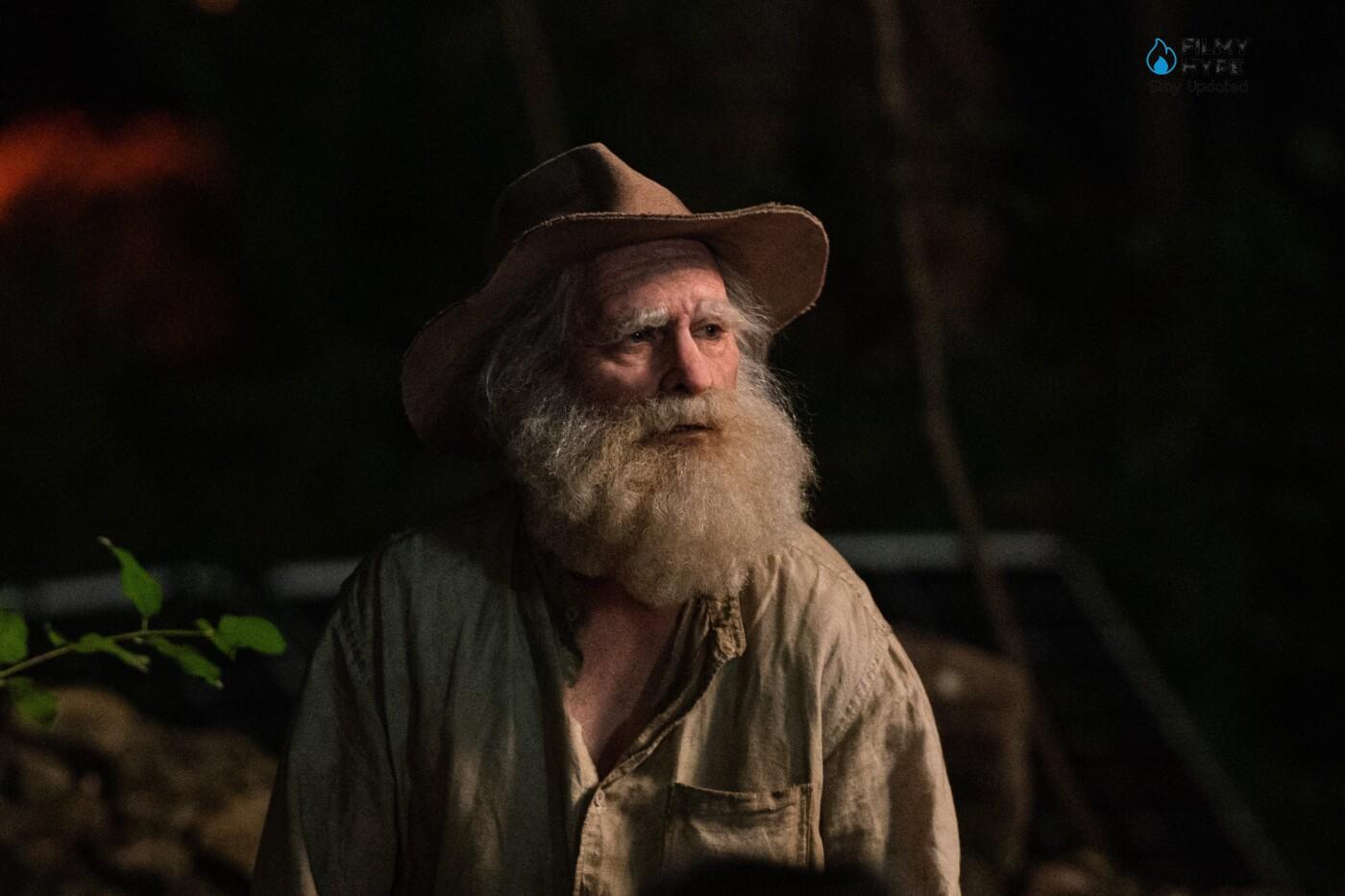
It is no coincidence that the film begins with Beau’s POV at the time of delivery; from the amniotic fluid of the mother’s womb to his death by water, all of Aster’s work is crossed by the element of water: for example, the medicine prescribed to him by the psychiatrist in the first scenes of the film must necessarily be swallowed together with water, while the surname Wasserman (and by extension, the town of Wasserton) is a syntactic construction that contains the German term “wasser”, or water. As if to underline how much the lysergic journey (real, but also mental) Beau Is Afraid of is attributable to an Oedipus complex that is difficult to eradicate from the psyche of the fragile protagonist, the main subject of an odyssey between fears and intimate desires from the form circular: from the water of the mother’s amniotic fluid to death by drowning, we have simply witnessed the life of Beau Wasserman and a film about how much the mother figure can influence the lives of children. For better or for worse.


